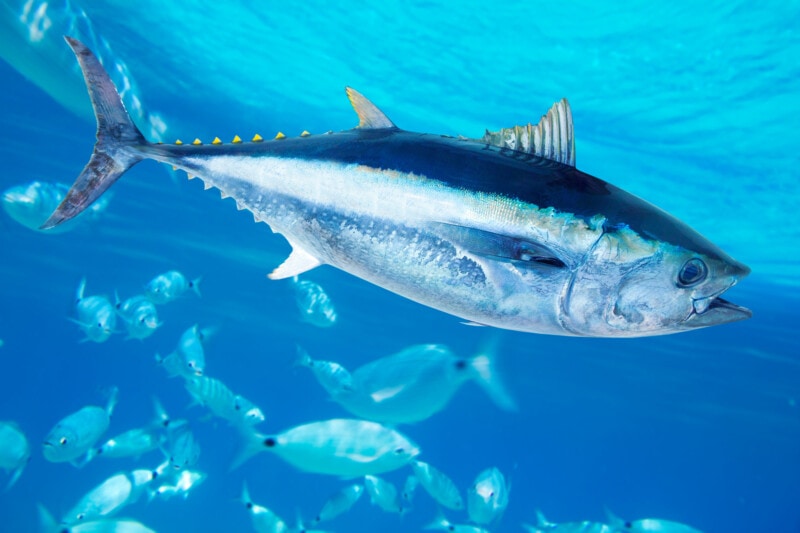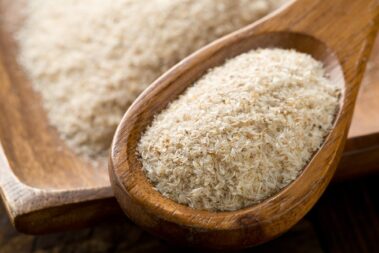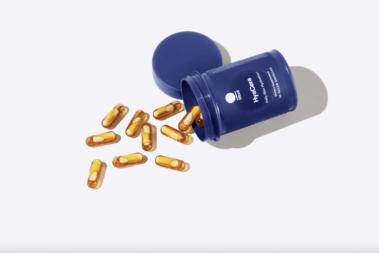By now, everyone knows about all the miraculous benefits of fish oil. And it seems we’re discovering more every day.
But fish oil isn’t without its faults. Not only does harvesting these oily fish come at a high environmental cost, but for those following a vegetarian or vegan lifestyle, fish oil carries ethical implications as well.
Luckily, if you want to reap the benefits of fish oil without consuming fish, you have some options.
We talked with Lauren Panoff, MPH, RD, to find out why the omega fatty acids in fish oil are so good for you and why fish oil might not be the best source for them. She also gave us her recommendations for the best vegan alternatives to fish oil.
Table of Contents
What Is Fish Oil?
The oil in fish oil supplements comes from small fatty fish species such as sardines, anchovies, and menhaden. The oil is extracted by cooking the fish and purifying the fats from the protein.
The fats present in these fish are largely long-chain polyunsaturated fatty acids, specifically omega-3 fatty acids. The exact makeup of the oil depends on the type of fish used and can also vary by season and the purification process used(1).
The Benefits of Fish Oil
The primary benefits of taking fish oil supplements are attributed to their concentrated omega-3 fatty acid content. Fish oil is a convenient way to obtain the omega-3s EPA and DHA for people who don’t regularly consume seafood and other foods naturally high in these nutrients.
According to Lauren, omega-3s play an important role in many bodily systems.
“Getting enough omega-3s in the diet, particularly DHA, has been shown to support the health of your eyes, heart, brain, immune system, and normal inflammatory response,” she says. “Some studies have also found benefits for improving insulin sensitivity when people with metabolic disorders add fish oil to their routine.
“Other research shows that the fatty acids in fish oil may help improve skin health and skin complaints like dryness and hyperpigmentation. Omega-3s are important for brain structure and function, and getting enough of them may help reduce the risk for depression and neurodegenerative diseases like Parkinson’s and Alzheimer’s dementia.”
The Drawbacks of Fish Oil
There is no question that omega-3 fatty acids are very beneficial to the body. But using fish oil as the delivery mechanism for omegas does have some downsides in terms of health risks, environmental impact, and ethical concerns.
Health Risks
The biggest health risk people associate with eating too much fish is ingesting high amounts of mercury. Luckily, fish oil contains very little mercury compared to what is found in the typical large fish filet.
Still, Lauren cautions, there are some health risks associated with fish oil that everyone should be aware of.
“Fish oil is generally considered safe with mild side effects,” Lauren says. “Potential side effects from using fish oil supplements seem to be dose-dependent, meaning that the higher dosage you take, the more likely you are to experience them.
“Some of the more commonly reported side effects from fish oil include nausea, abdominal pain, diarrhea, and fish burps.”
Lauren also cautions that fish oil may interact with certain medications.
“High-dose omega-3 supplements may increase your risk for bleeding if you take an anti-platelet or anticoagulant drug. It may also be best to avoid fish oil if you have diabetes and struggle with blood sugar or blood lipid control, as it can worsen these. Lastly, fish oil should be avoided for at least one week prior to surgery due to the risk for excessive bleeding.
“To reduce the risk of adverse effects,” Lauren says, “it’s a good practice to look for fish oils that have been third-party tested both to verify their EPA and DHA content as well as the presence of mercury. Always speak with your healthcare provider before adding fish oil or any new supplement to your routine to make sure it’s safe and appropriate for you.”
Environmental Impact
There is some belief that because oily fish are small, prey-type fish on a lower level of the food chain, harvesting them has less impact on the ecosystem than harvesting predators like salmon or tuna. But the fact is, we are harvesting oily fish in such massive numbers that it would be impossible for the ecosystem to not be affected.
Currently, about one-quarter of the fish pulled from the sea each year are used to make fish oil supplements for humans and livestock(2). This equates to about 25 million metric tons of prey fish being harvested each and every year.
Removing such a massive amount of prey from the ocean not only affects those species’ survivability but that of every sea animal higher than them on the food chain, all the way up to sharks and dolphins.
The fact is, eating large fish or even small fish in whole-food form has a much lower impact on the ocean ecosystem than harvesting fish for fish oil supplements does.
One alternative to fish oil that many people turn to because they think it has a lower environmental impact is krill oil.
Krill, which are tiny crustaceans closely related to shrimp, live largely in the cold waters around Antarctica. These tiny creatures are a food source for many sea and non-sea dwelling animals including seals, whales, sea birds, and small fish like anchovies and sardines. Krill also play an important role in sequestering carbon, which helps reduce the effects of climate change (source).
By focusing oil-harvesting efforts on krill instead of small fish, all we are doing is disrupting the ecosystem one level below where we’ve already caused problems. And by doing so, we are only guaranteeing the effects of our omega oil obsession have an even wider impact.
Furthermore, harvesting krill still has the same secondary negative impacts on the environment as harvesting fish. Pollution from boat fuel and discarded fishing equipment, carbon emissions from large fishing vessels, and bycatch still happen when fishing for krill.
Ethical Concerns
Of course, if you follow a vegan or vegetarian diet, the problem with fish oil is right in the name. Even krill are living, breathing organisms that people following a plant-based diet need to avoid.
And there are plenty of good ethical reasons to avoid eating fish and crustaceans. For one, recent evidence has finally put to bed the long-debated idea that fish cannot feel pain. We now know that, while the nervous system of fish differs from that of mammals, fish do in fact feel pain and are, therefore, capable of suffering(3).
Sure, there are still some scientists out there who refute this claim. But before you use this as a reason to ignore fish pain yourself, consider that it was not widely accepted in the veterinary community that animals, including dogs and cats, felt pain until the 1980s.
Vegan Sources of Omega Fatty Acids
For those looking to reap the benefits of omega-3s without using fish, krill, or other animal-based products, you’re in luck. There are many plant-based alternatives that are full of healthy omega fats and much easier on the planet.
Each of these options has its pros and cons with some options being a better overall choice than others.
Chia Seeds, Hemp Seeds, and Flax Seeds
Hemp seeds, chia seeds, and flaxseeds are all loaded with essential fatty acids. Unlike fish oil and other seafood which contain high levels of docosahexaenoic acid (DHA) and eicosapentaenoic acid (EPA), these vegetarian alternatives primarily contain alpha-linolenic acids (ALA).
ALA is used inside the body to create DHA and EPA, which are both necessary for a long list of metabolic processes. Unfortunately, research shows that dietary sources of ALA are inefficient for making these necessary omega fatty acids. In fact, only about 5% of the ALA consumed is converted to DHA and EPA(4).
This means that vegans and vegetarians need to consume a large amount of ALA-containing foods to get the same benefits provided by fish oil.
Luckily, incorporating a decent amount of these healthy seeds into your daily diet is easy. All three can be easily added to smoothies, parfaits, granola, and homemade energy bars.
According to Lauren, there are some extra steps you can take to assure you’re getting as much of those valuable omegas as you can.
“For the most omega-3 bioavailability and absorption from chia and flax seeds,” she says, “it’s helpful to eat them ground versus in whole form. You can purchase them pre-ground or buy them whole and grind them yourself.
Walnuts
Like the seeds mentioned above, walnuts are very high in ALA. In fact, they are the only nut that is considered an excellent source of ALA, providing about 2.5 grams per serving.
As with other ALA-heavy foods, you will need to consume more to get the same benefits as fish oil. But, again, this is relatively easy to do. Walnuts can be added to salads, granola, oatmeal, or toasted and used to top savory dishes like pesto pasta.
Perilla Oil
Perilla oil is derived from the roasted seeds of the perilla frutescens plant. It has long been used as a condiment to add nutty flavoring to savory dishes. More recently, it has gained popularity as a health supplement thanks to high levels of omega-3s.
Like the vegan alternatives listed above, perilla oil is a rich source of ALA. The levels are similar to flaxseed oil, but this option tends to be a little more affordable.
Being in oil form means it is easier to get the necessary amount of ALA from Perilla oil. But it also means it is more prone to spoilage, making it more important to find a reputable source and to store the product carefully.
Algal Oil
Algal oil is derived from various species of algae, from single-celled microalgae to giant seaweed. These green sea plants are some of the only plant-based sources of DHA and EPA.
Microalgae, especially, is very high in EPA and DHA. In fact, it is these organisms that provide fatty fish with the fatty acids that make up their body composition.
By going straight to the source of those omegas, you not only get a purer, more concentrated product, but you get all the benefits of fish oil without the drawbacks.
Algae used to make algae oil supplements come from farmed algae that are easily manipulated using UV light to produce high amounts of EPA and DHA. As with fish oil, the concentration and purity of omegas can vary by brand and the purification process used.
Unlike fish oil, algae can be grown in controlled environments without impacting local ecosystems. These products are also less likely to contain contaminants than farmed or wild fish due to this added layer of control.
The Best Vegan Omega-3 Supplements
When it comes to adding omega-containing, whole, vegetarian foods to your diet, you have a lot of options. But when it comes to the best vegan source of omega-3, algal oil is the clear choice.
In this category, you have a growing number of options in terms of brands and products, but this algal oil supplement is our favorite. Each serving contains 300mg DHA and 150mg EPA from pure algal oil. It’s sustainably harvested from a controlled indoor fermenting process of non-GMO microalgae in North Carolina, and third-party tested to ensure quality and safety.
For more great vegan alternative supplements, check out our full list of the best vegan omega-3 supplements.
As always, be sure to consult a health professional before taking a new supplement, especially if you are taking medication, pregnant, or breastfeeding.
How to Store Omega Fatty Acids
Regardless of the source of your omega fatty acids, know that these fats always degrade very quickly. This makes how you store your omega-containing foods and supplements very important.
The best place to store these foods and oils is in a dark, cool location, such as the fridge or cellar. Rendered oils, such as fish oil supplements and refined oils, go rancid quicker than whole food forms.
Similarly, ground forms, such as ground flaxseed or chia seed, will go bad quicker than whole seed forms. In either case, it is best to store your omega-containing seeds in the freezer.
Ditch the Fish While Still Reaping the Health Benefits
There is no doubt that a diet high in omega-3 fatty acids provides many benefits from heart health to eye health. For people following a vegetarian diet, vegan diet, or plant-based diet, getting enough omega fatty acids in the right amount can be difficult.
Luckily, it is possible to consume enough omega-3 to get all the benefits provided by fish oil without having to contribute to ocean imbalance, depleting fisheries, and climate change.
Seeds such as chia and flax, walnuts, and perilla oil all provide easy and delicious ways to add ALA to your diet. For a concentrated dose of EPA and DHA, algal oil supplements are your best bet.
This ethically-sound, environmentally-friendly alternative to fish oil provides the same benefits as fish oil without the drawbacks. If you’re looking to add some omegas to your diet, a high quality algal oil supplement may be a good choice for you.
- How to Pick the Perfect Watermelon For a Sweet Summer Treat - April 10, 2024
- Future Kind’s Foundations: A Multivitamin Made for Vegans - December 5, 2023
- Does Nutritional Yeast Go Bad? - November 28, 2023







